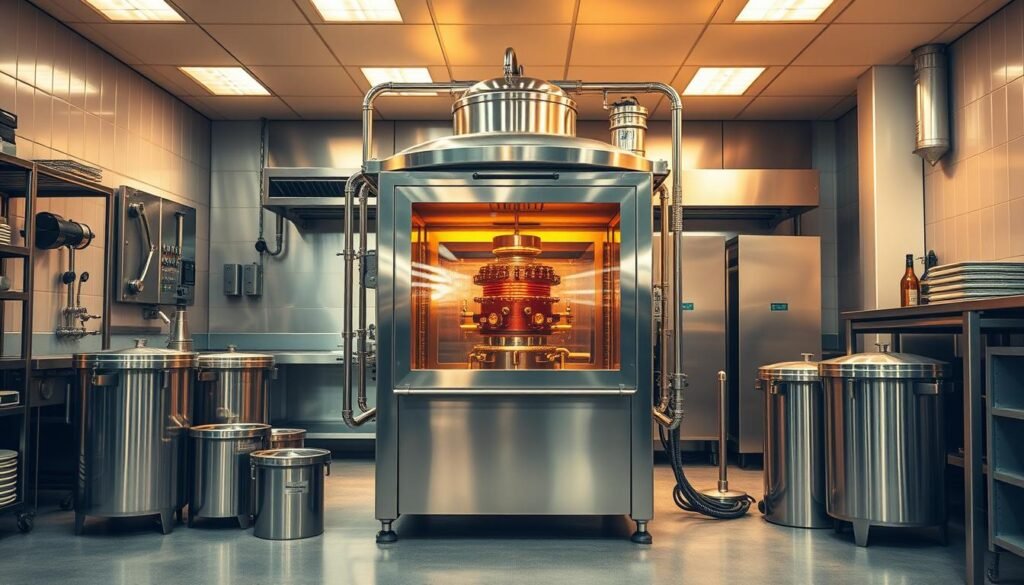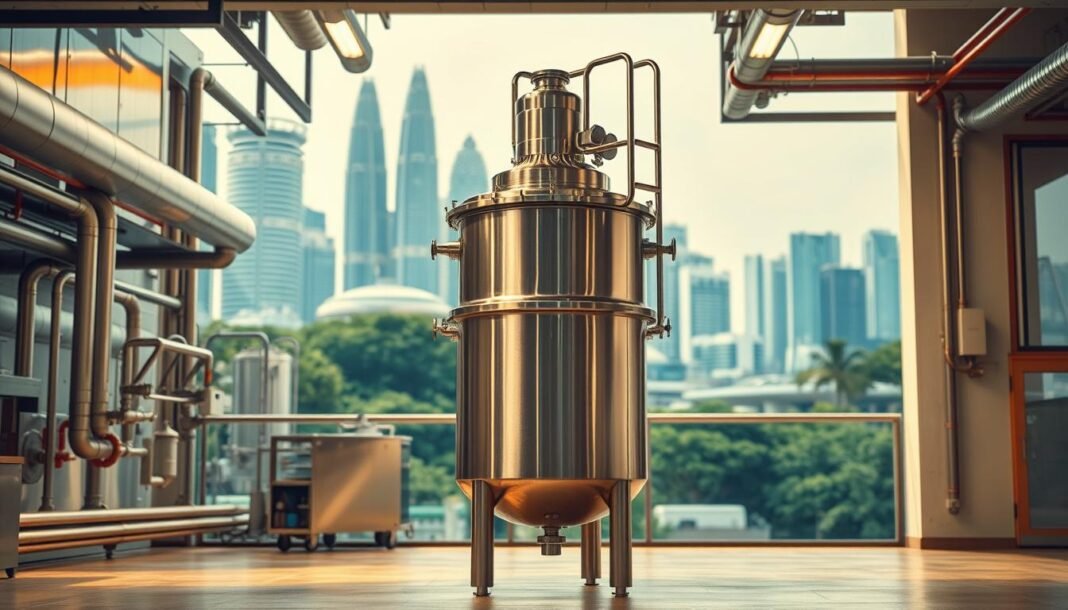Managing kitchen grease is crucial for businesses in Singapore. A good grease separator ensures you follow local laws and keeps your operations running smoothly. Greasera’s models, made of stainless steel, are built to last and handle heavy use.
These separators meet EN 1825 standards and Singapore PUB requirements. They prevent clogged drains and protect the environment.
Key Takeaways
- Grease separator singapore systems prevent costly plumbing damage and legal penalties.
- Stainless steel construction ensures longevity and low maintenance costs.
- Compliance with PUB guidelines protects businesses from fines and shutdowns.
- EN 1825-certified separators guarantee efficient grease removal and durability.
- Investing in quality systems aligns with Singapore’s sustainability initiatives.
Overview of Grease Separators in Singapore
Singapore’s food and commercial sectors produce a lot of waste. This waste needs to be managed well. Grease separators are key in stopping FOG (fats, oils, and greases) before they damage our drainage systems or the environment. These systems use science to protect our infrastructure and meet strict environmental standards.
Introduction to Grease Separation Technology
Grease separators work by using physics and engineering. They separate waste by letting heavy solids sink and FOG float. Advanced models use materials like polymer filters to catch residues. They have parts like inlet baffles, separation tanks, and outlets. Now, they even have smart sensors to remind operators when maintenance is needed.
Understanding Local Waste Management Challenges
Singapore’s urban setup poses challenges. Old pipelines and a high population density put a lot of pressure on our wastewater systems. Restaurants and food courts often face blockages because of bad FOG disposal. The National Environment Agency (NEA) has strict rules, and businesses that don’t follow them face fines.
“Without proper separators, our drains clogged monthly. Upgrading solved this.” – Commercial Kitchen Manager, Singapore
Businesses have to find a balance between being efficient and following the rules. Now, there are advanced separators that are compact and fit well in tight spaces. This ensures businesses can follow the rules without disrupting their work.
Essential Components and Mechanisms of Grease Separators
Every commercial grease separator has a system of parts working together. These parts help manage grease well, making sure wastewater meets standards before it leaves your place.
“A well-designed separator balances simplicity with precision, turning complex waste streams into manageable solutions.” — Singapore Environmental Council Technical Manual
Anatomy of a Grease Separator
Key parts include:
- Baffles: These deflect water flow, slowing it down so grease floats upward.
- Collection Chambers: Trap grease layers for easy removal, often made from corrosion-resistant materials like those in Greasera’s durable systems.
- Inlet/Outlet Pipes: Direct wastewater through the separator’s filtration zones.
- Filtration Screens: Strain solid particles before water exits the system.
How Components Work Together
When wastewater enters, baffles redirect flow to separate oil and solids. Grease accumulates in designated chambers, while filtered water exits safely. Regular maintenance ensures these parts function as intended. Proper alignment of inlets and outlets prevents backflow, a critical detail in high-volume kitchens or food courts.
Materials matter too—stainless steel components resist corrosion better than cheaper alternatives, extending lifespan. This synergy of design and material science ensures compliance with NEA guidelines while minimizing operational downtime.
Grease Separator Singapore: Meeting Local Regulations
Following local regulations Singapore is crucial for businesses with grease separators. The government has strict rules to protect waterways and public health. These rules help waste management meet national sustainability goals.

Regulatory Requirements in Singapore
The Public Utilities Board (PUB) and National Environment Agency (NEA) set rules for grease separators. Businesses must use systems certified by NEA’s Trade Effluent Guidelines. They also need to keep up with regular inspections and maintenance to avoid fines.
Benefits of Compliance
- Avoid fines of up to S$10,000 for not following local regulations Singapore.
- Stop environmental damage by keeping oil out of Singapore’s drainage systems.
- Show your commitment to public health and improve your business reputation.
Real-World Examples of Compliance Success
“After upgrading to NEA-approved separators, our restaurant reduced grease blockages by 80%.”
Companies like Greasera work with hotels and F&B chains to install compliant systems. Their solutions meet PUB’s standards, ensuring waste management is smooth and legal.
Benefits of Investing in High-Quality Grease Separators
High-quality grease separators offer long-term benefits for businesses in Singapore. They ensure efficient waste water treatment and reduce disruptions. These systems protect plumbing and meet environmental standards, adding value over time.
Improved Operational Efficiency
Modern separators stop grease buildup that blocks drains. This keeps kitchens and facilities running well. By filtering fats and oils onsite, businesses avoid expensive shutdowns:
- Reduces plumbing emergencies by up to 65% (data from Environmental Protection Agency studies)
- Cuts repair downtime by keeping drainage lines clean
Cost Savings Over Time
High-quality systems save money through:
| Benefit | Annual Savings Example |
|---|---|
| Maintenance Reduction | $3,000-$8,000 per year |
| Waste water treatment compliance | Avoids fines and penalties |
Studies show businesses like ABC Catering save 25% on costs after installing advanced separators. Proper waste water treatment also makes equipment last 40% longer, reducing replacement needs.
“Our separator investment paid for itself in 18 months through reduced repair bills.”
— Singapore Food Services Association report, 2023
Investing in quality systems is smart. It protects budgets and ensures environmental compliance, making it a strategic choice for sustainable growth.
Installation and Maintenance Best Practices
Installing and maintaining a stainless steel grease trap right is key for lasting performance. Companies in Singapore, like SL Grease Control Pte Ltd, say following the rules helps avoid expensive mistakes.
Steps for Seamless Installation
Begin with a clean, easy-to-reach spot. Make sure the area’s water temperature is not too hot or cold. This prevents grease from solidifying. Always follow the maker’s guide to avoid leaks or breakdowns.
- Clear the area of any dirt or blocks.
- Put the unit where it’s easy to check regularly.
- Put parts together as shown to keep water flowing right.
“A well-installed separator saves time and money in the long run,” says SL Grease Control Pte Ltd’s technical team.
Regular Maintenance Tips
Here’s how to keep your stainless steel grease trap in top shape:
- Check the pressure and flow every day to catch problems early.
- Scrub off sludge every month to stop clogs.
- Look at seals and filters every three months; replace them if they’re worn out.
Common Installation Pitfalls
Avoid these mistakes to protect your investment:
- Ignoring slope needs: Make sure it’s angled right for gravity flow.
- Skipping regular checks: Not keeping up with maintenance lowers efficiency.
Good care makes your stainless steel grease trap a reliable tool. It cuts down on downtime and environmental harm.
Custom Solutions for Diverse Business Needs
Every business has its own needs for grease management. Custom grease removal solutions fit the unique space and work needs of kitchens. They work well for small cafes or big hotels, handling waste efficiently without using too much space or money.

Tailored Systems for Different Scale Operations
Small businesses need compact designs to save space. Modular grease removal solutions can grow with your business. For big kitchens, systems can handle more waste while following rules.
Adaptive Technology for Various Industries
Restaurants, food courts, and manufacturers face different grease problems. Smart systems adjust to different grease types and temperatures. For example, bakeries need special filters for dairy waste, while deep-fried places need other solutions.
How Grease Separators Enhance Environmental Compliance
Modern grease separators from Bio-Care and Greasera are key in Singapore’s green efforts. They stop fats, oils, and greases (FOG) from getting into drains. This keeps waterways clean and supports Singapore’s goal for a green city.
Impact on Local Environmental Standards
Old waste management ways can clog drains, leading to floods and pollution. But, new grease separators catch 90%+ of FOG. This meets the National Environmental Agency (NEA) standards. It also protects places like the Singapore River and Kallang Basin.
| Comparison Area | Traditional Methods | Modern Grease Separators |
|---|---|---|
| FOG Removal Efficiency | Low (20-40%) | High (85-95%) |
| Environmental Impact | High pollution risk | Reduced contamination |
| Compliance | Often non-compliant | NEA-regulated standards |
Supporting Singapore’s Sustainability Goals
Grease separators help Singapore meet its green goals by 2030. For example, Bio-Care’s EcoFilter series turns captured grease into biofuel. This cuts down on landfill waste.
“Our separators cut FOG discharge by 90%, helping businesses meet environmental targets while lowering operational costs.”
These innovations help Singapore aim to be a zero-waste city. By using environmentally friendly grease control, businesses help keep waterways clean. This ensures a healthy environment for everyone.
Real-Life Success Stories from Singapore Businesses
Learn how grease separator singapore solutions have helped real businesses. Food courts and hotels in Singapore talk about their success. They’ve seen better efficiency and saved money.
| Business | Challenge | Solution | Result |
|---|---|---|---|
| Urban Bistro Group | Frequent drain blockages | Installed Bio-Care grease separators | 90% reduction in maintenance calls |
| Harbourfront Hotel | High disposal costs | SL Grease Control system | Annual savings of SGD 15,000 |
“The grease separator singapore system cut our cleanup time by half.” – Chef Lim, Urban Bistro Group
Restaurants using these systems have smoother operations and follow rules better. They’ve seen less downtime and lower bills. These stories show how the right grease separator singapore can change challenges into chances.
Tips on Selecting the Right Grease Separator
Choosing the right grease separator is all about setting clear goals. Look for systems that focus on clean grease management to meet Singapore’s environmental standards. Here are some tips to help you:
Key Factors to Consider
- Capacity: Choose a size that matches your business’s grease output. Restaurants and food courts need bigger models.
- Material Quality: Go for durable materials like stainless steel. They resist corrosion and last longer.
- Compliance: Make sure the model is approved by Singapore’s National Environment Agency (NEA) for regulatory alignment.
- Maintenance: Pick designs that are easy to clean. This makes routine upkeep simpler.
Expert Advice and Recommendations
“Focus on systems with automated monitoring features. They alert you to maintenance needs, preventing overflow and contamination.”
Experts like Greasera and SL Grease Control emphasize the need for scalability. Start by assessing your current needs and future growth. Compare models from certified providers like Bio-Care, which offer warranties and technical support.
Always request a site evaluation to find the best installation layout. Spending time on this step can save you from costly mistakes. It ensures your system lasts for years.
Conclusion
Commercial grease separators are key for businesses in Singapore. They keep operations running smoothly while protecting the environment. These systems stop costly blockages and keep the sewerage network safe by separating fats, oils, and grease (FOG) from wastewater.
For food and drink businesses, a good separator is a must. It meets NEA and PUB standards and keeps the community healthy. Investing in quality is a smart move.
Keeping your separator in good shape is crucial. Regular cleaning, like checking it every two weeks, stops buildup. CCTV checks and proper waste disposal also help it last longer.
By doing this, businesses avoid fines and protect the environment. They also show they care about the planet. This boosts their reputation.
Choosing the right separator is important. You need to think about how much water your business uses and how much FOG it produces. Working with certified installers ensures it’s set up correctly.
By focusing on maintenance and following rules, businesses save money in the long run. This supports Singapore’s goal for a green city. Your choice to manage grease well helps keep waterways clean and communities safe.




